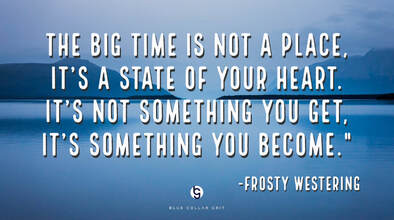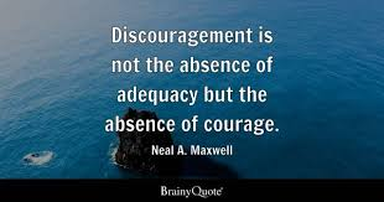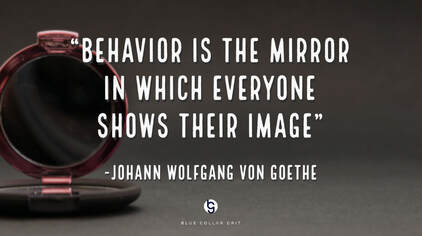There Is No ThereSummer seems to bring more travel for most people. As families set off on their much anticipated vacations, they inevitably punch the desired location into their GPS. No more folded up maps from the glovebox or printed sheets from MapQuest.
The GPS takes care of all of it. Estimated arrival time, remaining miles, and the time left in our trip are all displayed and adjusted in real time. Heck, they’ll even alert you to potential speed traps, obstacles on roads, and traffic jams. Of course, before any of these services are engaged we have to input our destination. Without knowing where we are going, none of the amenities our GPS offers are of any good. Although we would like for our pursuits in life to be as clean, and simple, as our GPS directions, they’re not. Could you imagine potential obstacle alerts, slowed traffic, or alternate route suggestions?! But the truth is, we don’t want it to be. Why Should We Care? Though we spend most of our time trying to keep life clean and orderly, we eventually realize it’s all the off-road, unbeaten paths, and wrong turns that make life worth living. Where we think we’re going is hardly ever where we end up. Or, if we do happen to end up at the destination we set out to reach, we recognize the process of getting there far exceeds the experience of being THERE. Society and personal growth gurus would like to have us believe that we all should be reaching up for the next rung on the ladder, climbing our way to a better future - always trying to get THERE. Good enough never is and some always leaves us wanting more. Of course, we bite. We work the extra hours at the expense of the people we love. We take the promotion, leaving a job we were perfectly suited for and enjoyed. We move away from friends and family in an effort to position ourselves for the next great opportunity to advance. All in the pursuit of THERE. The thing is, there is no there. Sure, we want to set goals and have ambitions in order to stretch ourselves. We want to work to maximize our potential and become the best we can possibly become at whatever we do. But we never find those things THERE. We always find them on the way. REAL TALK - Action Steps Our fulfillment isn’t positional. It’s operational. What and why we do things is what will determine our impact and fulfillment much more so than where we do it. Here’s a few ideas on how to “Make the Big Time Where You Are”, as Frosty Westering’s great book suggests.
There is no there. We are never getting there. And, truth be told, we don’t really want to get there. Life is only lived here, where our feet are. Stay here. For more information on building excellence in your teams, visit us at www.bluecollargrit.com. We would love to know how we could help!
1 Comment
Change the QuestionI had a player that I was struggling to get the most out of. As a coach, or leader, part of our goal is always to bring the very best out of each member of our team. It’s not always easy, we fail often, but this is always the charge.
This particular player was beginning to become frustrated with himself. And, I can’t say I was not closing in on frustration myself. I continually asked myself what was wrong with him, what his deal was! His performance was declining quickly. In part due to his play and in part due to his attitude regarding his play. As the season wore on, it became clear that he may not come out of his funk at all. Our coaching staff racked our brains for the answer that would unlock this player’s potential. It could not be that significant of an issue - he was a good kid, played hard, and tried to do what we asked him to do. We eventually cracked the code with an exercise we call “Show Me Love” in which each member or our team shares how they best receive love and appreciation. The answers vary much more than you might think, but the power of the exercise doesn’t lie in each individual’s response. This exercise only comes to life when leaders and team members apply what they learned. In this player’s case, one of the ways to show him love was to tell him jokes. As odd as that sounds, knowing this was only beneficial if we acted on it. So, we did. Every day in practice one of our assistant coaches would write down a few short jokes to share with this player at various times during practice. The impact was incredible. The low energy kid, trudging through practice just to reach the end almost immediately turned into a laughing, smiling ball of joy that infected everyone around him. Why Should We Care? Following the season we went through our regular postseason reflection to examine what went well and what we need to do differently to improve for the future. Many things came up within our discussions including the drastic change in the player mentioned above. In contemplating the situation, we came to the conclusion that it was our fault it took him so long to realize and perform at his potential. Now, that’s not revolutionary, of course. As the leaders, we should be assuming the responsibility for everything that happens on our team. It’s all our fault. However, the fault didn’t lie in a lack of caring or action. Our mistake was more foundational than that. We were asking the wrong question at the start. The initial response by a leader for an underperforming team member is usually, “what is wrong with him?” This line of thinking places responsibility solely on the subject of the question while releasing you from any duty in the matter. “What’s wrong with him?” is the wrong question. We should be asking, “what happened to him?” and “how can I help him?”. These are questions that lead to fruitful answers and impactful actions. By sharing in the problem we take the first step in any positive relationship: trust. REAL TALK - Action Steps This is most likely not your default mindset - to immediately become curious about why someone acts the way they do. Yet, it is undoubtedly the mindset that sets us up to be the best version of ourselves. Here are a few ideas to help you ask the right question.
The questions we ask are often more telling than the answers we get. Oftentimes our undisclosed purpose lies within the very questions we ask. Consider them carefully. For more information on building excellence in your teams, visit us at www.bluecollargrit.com. We would love to know how we could help! Discouragement ThresholdOur basset hound, Izzy, fell down a lot as a puppy. Not because something was wrong with her, but because her ears were so long that she would step on them, sending her into a sliding front flip. It wasn’t a big deal, after all she was already pretty close to the ground, but there was clearly no delay in her response to the fall. She would immediately resume her chase time after time, never discouraged.
I’m sure most reading this are familiar with the failures faced by Abraham Lincoln. He certainly had plenty of opportunities to be discouraged. Like after losing his job in 1832 or when he was defeated for the state legislature the same year. Like when his business venture failed in 1833 or when his significant other passed away in 1835. Like when he had a nervous breakdown in 1836 or when he lost his bid for Speaker of the House in 1838. Like when he lost the nomination for Congress in 1843 or when he lost the renomination for Congress in 1848. Like when he was rejected for land officer in 1849 or when he was defeated for the US Senate in 1854. Like when he lost the nomination for Vice President in 1856 or when he was defeated for the US Senate again in 1858. Of course, all that failure culminated in being elected to the presidency in 1860, going on to become one of the most influential leaders in American history. The discouragement never got the best of him. His persistence won out. Why Should We Care? Nothing predicts our future as well as our ability to handle discouragement. Those that are discouraged easily are going to have a rough go of it because the discouragement is coming. And, it keeps coming. As leaders, there are few things we can do for those we lead as impactful as helping them grow their discouragement threshold. The mentality gained from this mindset literally impacts all aspects of our lives. We begin to see options where we once only saw obstacles. We see what could be rather than what can’t be. A high enough threshold for discouragement can actually eliminate discouragement completely. As we become accustomed to facing it we begin to realize its only discouragement if we allow ourselves to label it as such. Or worse yet, we entrust our feelings of discouragement to the opinions of others. Of course, this high threshold isn’t easy to develop. It’s a myriad of core beliefs and actions that come together to create persistence that isn’t dependent on events or circumstances. It’s dependent on only the present, dismissing the past the moment it happens. After all, discouragement can only live in the past. REAL TALK - Action Steps While there is a number of things that could go into our perspective on discouragement, below are a few that are critical to our ability to persist consistently.
So, what does it take to discourage you? Work to push that line or eliminate it completely. For more information on building excellence in your teams, visit us at www.bluecollargrit.com. We would love to know how we could help! Behavioral IntegrityIn the cupboard at my mom and dad’s house, there is still a list of friends from high school. This worn roster of names and phone numbers was my ‘little black book’ for pickup basketball games throughout the mid-nineties. With adult structured games far less common, we took it upon ourselves to organize our own games. And, I was the one that did all the organizing.
When I would call guys to play, I always knew certain guys would play no matter what they had going on. I loved those guys. Then we had a group of guys that would play if they didn’t have any conflicts. I would always call to check with them. Then, there were the two groups of guys that found themselves crossed off my list. First, the guys that always had an excuse for why they couldn’t play. I didn’t mind these guys too much. Afterall, they didn’t waste much of my time. I figured out pretty quickly to stop calling them. The group that I was the least accepting of were the guys that would say they could play, then not show up. This was a one strike deal for me. After the first time, they were crossed off my list and never called again. Integrity, specifically behavioral integrity, is one of the most important characteristics a person can possess. It’s equally as important for a leader. Why Should We Care? Our willingness to choose - and to be clear, this is a willingness to choose not a talent or skill - to do what we say we’re going to do is first, and foremost a message to ourselves. We are either reinforcing our consistent discipline to align our behaviors or we’re reinforcing our inconsistent discipline to align our behaviors. Each repetition builds confidence or doubt in ourselves. We’re the only ones we can’t fool. No amount of justification or viable excuses will suffice our personal truth. We always know. The second most important aspect associated with behavioral integrity is the impact on those we lead. As a leader, there is no place to hide. You’re always ‘on’. As much as we would like to, we can’t step out of our leadership role at our convenience. Your 1st grade teacher is always your teacher - you probably still even refer to them as Mr or Mrs. Your behavior can’t opt out either. Integrity doesn’t clock in and clock out. Behavioral integrity is the foundation for trust in any relationship. Those watching us are constantly evaluating whether or not they can trust us. It’s not a deposit we can make and forget about. It’s a daily donation we must make in order to garner the respect needed for others to allow us to lead them. Likewise, we are constantly checking the behavioral integrity of those within our team. The first we earmark as needing to go almost always lack the willingness to choose behavioral integrity. Trust is impossible without it and reaching your potential as a team is equally unlikely. REAL TALK - Action Steps Behavioral integrity is not complicated. It’s actually simple. Here are a few thoughts on how you can simplify it for yourself.
Much of our impact is dependent on our willingness to uphold our behavioral integrity. With it, we are virtually unstoppable and can lead anyone. Without it, we are doomed and can’t lead anyone - including ourselves. For more information on building excellence in your teams, visit us at www.bluecollargrit.com. We would love to know how we could help! |
About bcI'm a teacher, coach, and parent seeking excellence while defining success on my own terms. Archives
July 2024
Categories |





 RSS Feed
RSS Feed